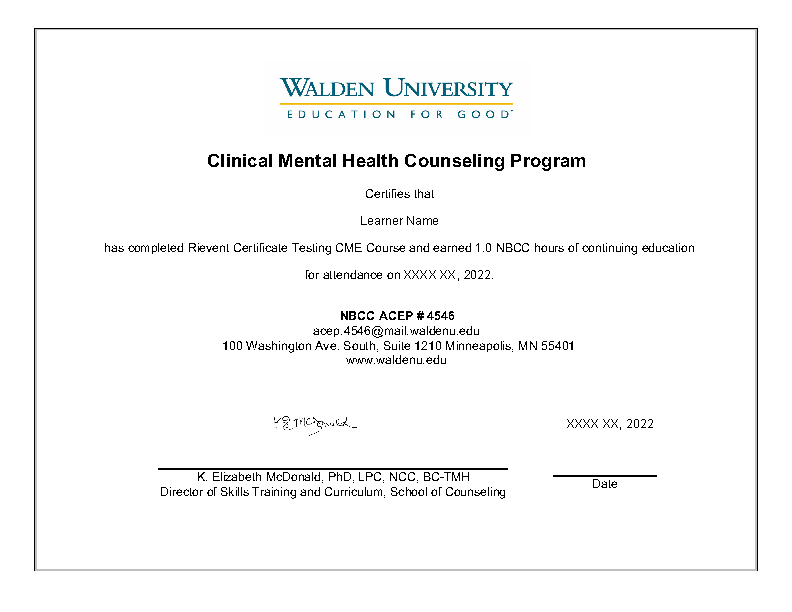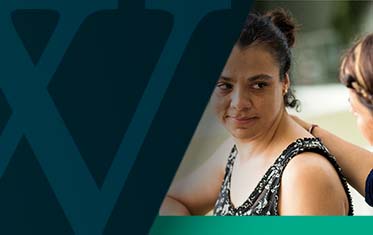- Professional Development
- All Level
- 1 NBCC hour
- Estimated 1-Hour Workload
- Self-Paced
- Accessible for 180 days
What You Will Learn
Upon successful completion of this micro-course, you will be able to:
- Identify the 5 DSM-5 OCD disorders.
- Differentiate obsessions from compulsions.
- Distinguish the differences between OCPD and OCD.
- Explain why OCD is called the "doubting disease" and distinguish OCD doubting from normal doubting.
Eligibility
- Must be 18 or older
Refund Policy
You will have 24 hours, or until you receive your completion certificate, to request a full refund after purchase, whichever comes first. No hidden fees. All books and materials are included with purchase.

Brittany Stahnke
Dr. Brittany Stahnke is a professor of social work at Newman University and a contributing faculty member at Walden University. She is the author of The Doubting Disease, a book on the realities of obsessive-compulsive disorder. Her research is in areas of mental health, marriage, and aging. When she is not teaching, mentoring, or conducting research, she can be found reading or writing. Dr. Stahnke enjoys what she does and believes that everyone should. It is her life’s work to guide students on their individual paths in the diverse field of helping professions.
Curriculum
Understanding OCD
Obsessive-compulsive disorder, despite being one of the most common mental health disorders and one of the top 10 disabilities in the world, is commonly misunderstood and thus misdiagnosed-and underdiagnosed.
Accreditation

Walden University’s Clinical Mental Health Counseling Program has been approved by NBCC as an Approved Continuing Education Provider, ACEP No. 4546. Programs that do not qualify for NBCC credit are clearly identified. Walden University’s Clinical Mental Health Counseling Program is solely responsible for all aspects of the programs.
Successful completion of this micro-course provides 1 NBCC clock hour; partial credit will not be offered.
ACEP contact information:
100 Washington Ave. S Suite 1210, Minneapolis MN, 55401
Email: [email protected]
Website: www.waldenu.edu
Features
The Doubting Disease
Understand one of the world’s most common and misunderstood mental disorders
Flexible Learning
Content provided in easily consumable segments so you can adapt your studies around your busy life
Awards

Micro-Course Badge for Recognizing and Understanding Obsessive Doubting: Obsessive-Compulsive Disorder

NBCC Certificate for Clock Hours
- Professional Development
- All Level
- 1 NBCC hour
- Estimated 1-Hour Workload
- Self-Paced
- Accessible for 180 days
How to enroll?
- 1Add course to cart
- 2Create your account
- 3Register for course
- 4Make payment and submit application
- 5Start learning
Who is this for
- Counseling professionals and other helping professionals seeking to identify, treat, heal, and support those who suffer with OCD
- Families and friends of individuals enduring OCD
Recently Viewed
WMCP1014 - Recognizing and Understanding Obsessive Doubting: Obsessive-Compulsive Disorder
Micro-Course | 1 NBCC hour | Estimated 1-Hour Workload
Start Now
WMCP1016 - Embracing Change and Navigating Through Uncertain Territory
Micro-Course | No Credit or CE | Estimated 1-Hour Workload
Start Now
Recommended Courses
WMCP2010 - Making a Difference with Mental Health Activism
Micro-Course | 1 NBCC hour | Estimated 1-Hour Workload
Start Now
WMCP2006 - Self-Care and Compassion for the Clinician
Micro-Course | 1 NBCC hour | Estimated 1-Hour Workload
Start Now









